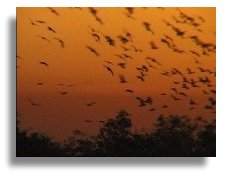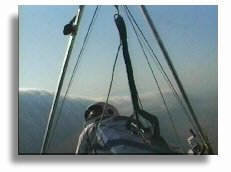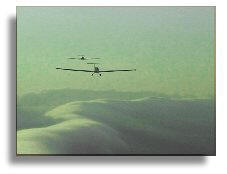
Morning Glory Articles
Letter 1934
Article 1989 First Morning Glory soaring flight
Article 1990
Article 1994
Article 1995
Letter from HG pilot 1995
1997 Trip
1998 Trip
1999 expedition notes
2000 expedition notes
Letters from pilots 2001

Sweers Island and the Gulf, A Chronology
The Investigator Tree, Sweers Island
Burketown History, & other Gulf info
Flora and Fauna of the Gulf
Morning Glory Documentary
Rob Thompson's Morning Glory documentary is often seen on cable
TV, on the National Geographic channel and others. The film features unique
ground and aerial footage of the Morning Glory, and many of the shots are
simply stunning. The documentary follows the activities of Dr Doug Christie
placing meteorological instruments in remote Gulf locations, and sailplane
and hang-glider pilots soaring the largest dynamic wave in the world.
Rob spent several months on location in the Gulf of Carpentaria in 1996
and a further 3 weeks in October 1997 filming the wave and the Gulf Savannah
environment. The result is a credit to both his enthusiasm for the Morning
Glory and his perseverance, considering the rarity of the wave and the
harsh environment in which he was forced to work.
 |
 |
- Richard Holle of Aerology.com
writes about Lunar Declinational Tides
Dr Doug Christie is currently in Vienna working with
the U.N. using the technology he developed studying Morning Glory waves
to pinpoint nuclear blasts.
Doug Christie on the Morning Glory
http://rses.anu.edu.au/seismology/ar96/atmo.html (404)Doug Christie
on Atmospheric Physics
If you like reading about fully nonlinear nonhydrostatic primitive
ensemble-averaged equations, this is the place to go!
Professor Roger Smith has been studying the Morning Glory for 15 or more years. He currently holds the chair of meteorology at Munich University. He has quite a number of nice images of the Morning Glory, but his website has gone walkabout.
Professor Peter Saenger of Southern Cross University and Lynne Battle
of Sweers Island have recently published their work on Sweers biota
in Australia Geographic.
Peter Saenger on Sweers History
and
The Investigator Tree
Gavin Pretor-Pinney of the UK and Australian photographer Barry Slade
spent two weeks in the Gulf in 2004 filming and photographing the cloud
and glider pilots. The results are stunning! Visit Gavin's cloudappreciationsociety.org
to read more about his adventures and download several movie clips.
Richard Manasseh of CSIRO Advanced Fluid Dynamics Laboratory has
several papers on atmospheric solitary waves available on the net:
Manasseh, R. & Middleton, J.H. 1995:
http://fluids.mel.dbce.csiro.au/~richman/a4142/a4142.ps - Boundary-layer
oscillations from thunderstorms at Sydney Airport.Postscript
file
Manasseh, R., Ching, C.Y. & Fernando, H.J.S. 1997:
http://fluids.mel.dbce.csiro.au/~richman/a711/a711.html - The transition
from density-driven to wave-dominated isolated flows. html
links to postscript files
Manasseh, R. & Middleton, J.H. 1995:
http://fluids.mel.dbce.csiro.au/~richman/a419/a419.html - A
thunderstorm outflow current visualized by bushfire smoke< - html, inc
pictures
Manasseh, R. & Middleton, J.H. 1997:
fluids.mel.dbce.csiro.au/~richman/a416/a416.html - The
surface wind gust regime and aircraft operations at Sydney Airport.
html
An early mention of the Morning Glory appears in William R. Corliss'
book "Handbook of Unusual Natural Phenomena". (Thanks to Sylvain Gravel)
From the Guestbook
Flew an aircraft down from Manilla this morning and saw quite a distinct
and long Morning Glory cloud by moonlight (about 4am local time) this morning
14/8/2000. Would have been roughly 250-300nms long just crossing the coast
around S15°35.6 E136°50.6
Bruce Fulton 14/8/2000
home | sitemap | aviation topics
Copyright © 1997-2026 dropbears ![]()




